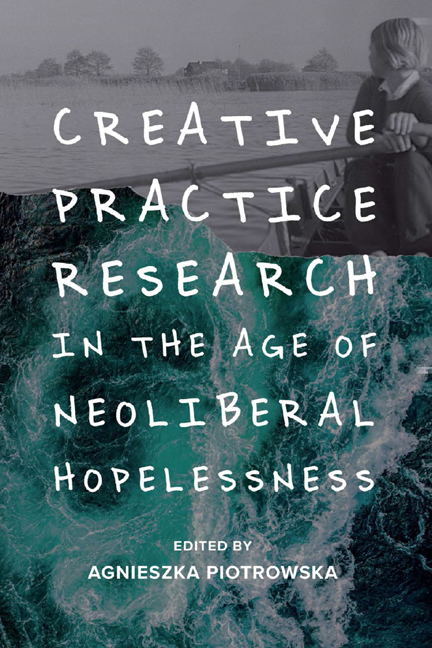Book contents
- Frontmatter
- Contents
- List of Figures
- Notes on Contributors
- Acknowledgements
- Preface: Life in the Post Pandemic Age
- Dedication
- 1 Introduction: Complexities, Compromises and Complicities
- 2 Against the Grain: Women Film Practitioners and Theorists Talk Creative Practice and Theory
- 3 Married to the Eiffel Tower: Notes on Love, Loss and Knowledge
- 4 Creativity and Neoliberalism: Between Autonomy, Resistance and Tactical Compliance
- 5 Tactical Compliance and the Persistence of Elsaesser
- 6 Storytelling and Game Playing
- 7 Autonomy and the Other Woman: Queer Active Agency and Postcolonial Expectations
- 8 From Neolithic to Neoliberal
- 9 First-person Expression on ‘Non-Western’ Screens: China as a Case Study
- 10 Scholarly Exploration of the Creative Process: Integrating Film Theory and Practice
- 11 Teaching Practice as Theory: Guerrilla Filmmaking
- 12 Baits of Falsehood: The Role of Fiction in Documentary or From Untheorised Practice to Unpractised Theory
- 13 Repented: A Creative Intersemiotic Translation
- Notes on Repented
- 14 How do you see me? The Camera as Transitional Object in Diasporic, Domestic Ethnography
- 15 ‘Shut Your Hole, Girlie. Mine's Making Money, Doll’: Creative Practice-Research and the Problem of Professionalism
- 16 Feminist ‘Pensive-creative Praxis’ and Irigaray: A Porous, Dialogical Encounter
- 17 The Paths of Creation, or How Can I Help my Dybbouk to Get Out of Me?
- 18 ‘We Want to Kill Boko Haram’: Reflections on the Photographic Representation of Children in a Displacement Camp
- 19 Between ‘Counter-movement’ (Ingold) and ‘Living with Ghosts’ (Demos)
- 20 Screen Memories: A Video Essay on Smultronstället/Wild Strawberries
- Index
12 - Baits of Falsehood: The Role of Fiction in Documentary or From Untheorised Practice to Unpractised Theory
Published online by Cambridge University Press: 17 October 2020
- Frontmatter
- Contents
- List of Figures
- Notes on Contributors
- Acknowledgements
- Preface: Life in the Post Pandemic Age
- Dedication
- 1 Introduction: Complexities, Compromises and Complicities
- 2 Against the Grain: Women Film Practitioners and Theorists Talk Creative Practice and Theory
- 3 Married to the Eiffel Tower: Notes on Love, Loss and Knowledge
- 4 Creativity and Neoliberalism: Between Autonomy, Resistance and Tactical Compliance
- 5 Tactical Compliance and the Persistence of Elsaesser
- 6 Storytelling and Game Playing
- 7 Autonomy and the Other Woman: Queer Active Agency and Postcolonial Expectations
- 8 From Neolithic to Neoliberal
- 9 First-person Expression on ‘Non-Western’ Screens: China as a Case Study
- 10 Scholarly Exploration of the Creative Process: Integrating Film Theory and Practice
- 11 Teaching Practice as Theory: Guerrilla Filmmaking
- 12 Baits of Falsehood: The Role of Fiction in Documentary or From Untheorised Practice to Unpractised Theory
- 13 Repented: A Creative Intersemiotic Translation
- Notes on Repented
- 14 How do you see me? The Camera as Transitional Object in Diasporic, Domestic Ethnography
- 15 ‘Shut Your Hole, Girlie. Mine's Making Money, Doll’: Creative Practice-Research and the Problem of Professionalism
- 16 Feminist ‘Pensive-creative Praxis’ and Irigaray: A Porous, Dialogical Encounter
- 17 The Paths of Creation, or How Can I Help my Dybbouk to Get Out of Me?
- 18 ‘We Want to Kill Boko Haram’: Reflections on the Photographic Representation of Children in a Displacement Camp
- 19 Between ‘Counter-movement’ (Ingold) and ‘Living with Ghosts’ (Demos)
- 20 Screen Memories: A Video Essay on Smultronstället/Wild Strawberries
- Index
Summary
This essay has no place in this book. I am involved in neither practice-led theory nor in theory-generating practice. For much of my career I made interview- based, historical documentaries very often concerned with traumatic and violent events still within living memory. After a break of a decade I returned to documentary as a theorist writing a doctoral thesis on the role of fictions in documentary film. My current interest in theory is in part an attempt to understand my own past practice and in part an attempt to understand the increasing tendency in current documentary practice to deploy fictions within the documentary frame; a tendency profoundly at odds with my past practice. At the heart of that practice was a belief that it was the documentary maker’s ethical duty not to fictionalise that ‘real’ world in the name of a compelling narrative.
UNTHEORISED PRACTICE
Looking back, my approach to documentary filmmaking in the late 1980s and 1990s was remarkably uninformed by theory. Somehow, I absorbed from the ether a way of making films which just seemed to be how one put together onehour or feature-length documentaries at the time. Working at the ‘serious’ end of the commercial sector, making films for BBC2 or Channel 4 in the United Kingdom and for similarly minded broadcasters abroad, I was aware of what other filmmakers were producing and the sort of films that received plaudits at the various documentary-film festivals. These films became the untheorised model or blueprint for my own documentary-making. There was little sense of working within a genre that had a history that offered a variety of forms and radically different possible approaches to filmmaking.
It was of course very difficult in the 1980s to gain a sense of the history of the documentary genre even if one wanted to. I remember spending months trying to get hold of a VHS copy of Peter Watkins's BBC docudrama Culloden (1964) after it was recommended to me. If you missed one of the rare screenings of a classic documentary at the National Film Theatre it might be months or years before the opportunity arose again. Documentary study has been transformed – has been made possible – by the increasingly ready availability of documentaries on VHS and then DVD and finally online.
- Type
- Chapter
- Information
- Creative Practice Research in the Age of Neoliberal Hopelessness , pp. 164 - 182Publisher: Edinburgh University PressPrint publication year: 2020



